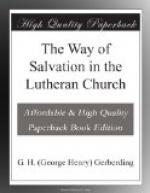Before we proceed, however, to note and examine the passages of Scripture bearing on the matter, let us recall what we said, as to the interpretation of Scripture, in one of the chapters on the Sacrament of Baptism. We there stated that our Church has certain plain and safe principles of interpretation that are always to guide the searcher after the truth of God’s word, viz.:
1. “A passage of Scripture is always to be taken in its plain, natural and literal sense, unless there is something in the text itself, or in the context, that clearly indicates that it is meant to be figurative.”
2. “A passage is never to be torn from its connection, but it is to be studied in connection with what goes before and follows after.”
3. “Scripture is to be interpreted by Scripture, the dark passages are to be compared with the more clear, bearing on the same subject.”
4. “We can never be fully certain that a doctrine is Scriptural until we have examined and compared all that the Word says on the subject.”
On these principles we wish to examine what the Word teaches as to the nature of the Sacrament of the Lord’s Supper. We note first the accounts of the institution as given by the three Evangelists, Matthew, Mark, and Luke. In Matthew xxvi. 26-28, we read, "Jesus took bread and blessed it and brake it, and gave it to the disciples and said; ‘Take, eat, this is my body.’ And he took the cup and gave thanks and gave it to, them saying: ’Drink ye all of it. For this is My blood of the New Testament, which is shed for many for the remission of sins.’" With this the accounts in Mark xix. 22-24, and in Luke xxii. 19, 20, substantially agree. There is a slight variation of the words, but the substance is the same.
We notice only this difference: Luke adds the words, “This do in remembrance of Me.” On this point let us notice, in passing, that St. Luke’s was the last written of the three. The Gospels of Matthew and Mark had been written and were read and used in the churches several years before St. Luke’s. And yet the two former do not contain the words, “Do this in remembrance of Me.” Now we submit right here, if to remember Christ were all that is in this sacrament, or even the chief thing, why did those who wrote the first Gospels, and knew that there were no others, leave out these words? But we go on.
Almost thirty years after the time of the institution of this sacrament, the great apostle of the Gentiles wrote a letter to the Church at Corinth. That Church was made up of a mixed multitude—Jews and Gentiles, freemen and slaves. Many of them were neither clear nor sound on points of Christian doctrine and practice. In his fatherly and affectionate letters to the members of this Church, Paul, among other things, gives them instruction concerning this sacrament; and, lest some of them might perhaps suppose that he is giving them merely his own wisdom and speculation, he takes especial care to disavow this: “For I have received of the Lord that which also I delivered unto you, that the Lord Jesus the same night in which he was betrayed, took bread,” etc., giving in substance the same words of institution as given by the Evangelists (1 Cor. xi. 23, 24, 25).




